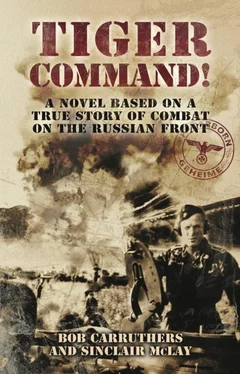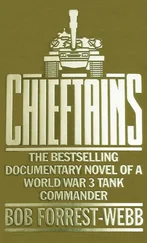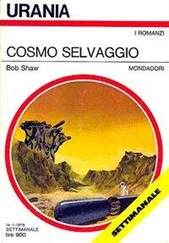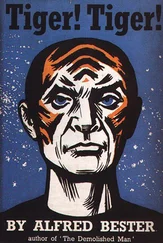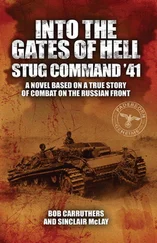Bob Carruthers and Sinclair McLay
TIGER COMMAND!
A NOVEL BASED ON A TRUE STORY OF COMBAT ON THE RUSSIAN FRONT
For Mr McWhinnie whom we are both privileged to have as a friend.
“Panzer rollen!” SS-Hauptsturmführer Hans von Schroif jerked his clenched fist downwards as if pulling on an imaginary bell chain and gave the familiar command. Responding with a smooth discipline bred from years of familiarity, driver SS-Panzerschütze Bobby Junge disengaged the clutch and the battered Panzer IV lurched violently into motion as it rolled forward towards the front.
Had the tank not been festooned with a motley selection of grenadiers precariously holding onto everything they could, the thankful landsers, sundry rear area warriors and the overworked engineers left behind in the assembly and supply area near the company workshops, would have noticed the neatly stencilled word Magda on the side of the vehicle.
Dutifully, the remaining tanks of his SS-Panzerkompanie fell in behind. They were followed by four SPW half-tracks, each packed to capacity with shivering grenadiers, as Kampfgruppe von Schroif began to rumble over the river of mud which constituted the main rollbahn to Rostov. The muddy morass of the Rostov road was unmistakeable, its route clearly marked on each side by the remains of thousands of stranded cars, trucks and carts which formed an almost unbroken verge of worn out and dilapidated wrecks. The few spectators, both military and civilian, watched in sullen silence as the column slithered its way past.
In addition to a prominent identifying number on the side of the turret, each of the succeeding tanks also bore the name of a wife or sweetheart left behind in the security of the Reich. Greta fell in behind Magda and one by one the small column of panzers skidded into position and began the treacherous journey towards Rostov.
Mounted in the turret of his battle-scarred Panzer IV, SS-Hauptsturmführer Hans von Schroif reflected ruefully on the fact that the twenty-two tanks which had come under his command in February had so recently constituted an impressive mass of ironclad might. He glanced backwards and counted the machines again.
“Seven? That’s it? Christ, this is getting serious!”
Time and time again over the last two months he had watched in horror as comrades were blown apart or died screaming in a mass of flame. No one who had heard it could ever forget the cries of dying men trapped in a burning tank… but the terrible sights and sounds of this godforsaken war in Russia crowded in on each other, and what had once seemed earth-shattering was now commonplace. There had been far too many funerals for death to make any further impression. Too many good men were now biting into the grass.
Russia had taken its toll. It wasn’t just the fighting either. In the logical side of his over-tired brain von Schroif knew and gratefully acknowledged that SS-Hauptscharführer Klaus Rubbal and his team at the battalion workshop did an amazing job keeping the tanks rolling forward, but the mud of this muddy season, the second which they had endured out here, tested the men and machines of the Panzerwaffe to their limits. The locals called it the rasputitsa, but von Schroif couldn’t give a damn what they called it. No single word could ever be sufficient to express his disgust and contempt. He was not well disposed to the locals and grumbled bitterly to himself that if the lazy bastards spent less time inventing stupid names and more time building a proper civilised road system, then none of them would be in this mess.
The desultory drizzle of misty rain which had been falling since 03:30 hours now gave way to a heavy fall of sleet, and the muddy surface was soon coated in a dispiriting blanket of grey. To von Schroif it seemed that this second Russian rasputitsa was even worse than the first season they had encountered in October ‘41. That first time, the unexpected phenomenon, with its endless and seemingly bottomless ocean of mud, had tested the vehicles to their limits and now, just six months later, here it was again. In his fatigued mind the two recent seasons of mud blended together to form one gruelling nightmare of muck and filth. The only redeeming feature was that the intervening horrors of the merciless Russian winter were temporarily forgotten as the grim nightmares of the white hell on earth now lay buried under a tidal wave of liquid clay.
As they rolled along, past groups of vaguely interested landsers huddled beside the miserable panje huts which passed for human habitations out here, the grenadiers and tank men alike cursed the rain, sleet and melting snow which had again turned every metre of the primitive Russian road network into one bottomless alley of mud. This awful bone-chilling and cloying mess stuck to everything and everyone.
Haupsturmführer von Schroif considered himself relatively lucky; he at least had a vehicle to ride on. He had, of course, to dismount for track failures, engine failures and a potential host of other irritating reasons, but nothing was sufficiently annoying to make him envy the hapless wayside figures he passed by as the tank slipped and slid through the mess. The despatch riders suffered most. To a man, they were coated in a uniform skin of sludge which gave them the look of elemental creatures formed in some demented kindergarten glory hole.
Faced with this new and implacable foe, the German horse-drawn transport system had completely broken down. The horse teams floundered in their efforts to make progress and the exhausted animals died in harness, overcome by the viscous morass. The only remaining solution to a host of day-to-day mobility problems had been to use his newly issued tanks as workhorses, and they were soon being requisitioned for every task imaginable.
It was now, too late, that the further limitations of the Panzer Mark IV came to light. The tracks, which seemed adequate by European standards, were hopelessly inadequate out here, beyond the reach of civilisation. The narrowness of its tracks made life nigh on impossible, but von Schroif knew, and reluctantly accepted, that his job was to make things possible.
The few tanks which had survived the fierce battles of the winter were now, once again, being pressed into service as recovery tractors, supply lorries, glorified staff cars and ammunition schleppers. Nothing else could get through the mud and there was simply no alternative. Already worn down and in need of spares and repair, Krupp’s finest were called upon for every conceivable job faced by a modern army. Engines which were already overworked were pushed to the limits as the panzers crawled through the sea of filth. Their road wheels and tracks barely visible, the few remaining panzers could usually be found dragging trucks from muddy pools or hauling staff cars to distant field conferences. Air filters and carburettors soon became clogged with mud. It seeped into every nook and cranny, obliterating vision ports and forcing the crew to drive with the hatches open, under a constant spray of mud thrown up by the tracks.
The only man who appeared immune to the misery of the muddy season was SS-Panzerschütze Otto Wohl, von Schroif’s main gun loader◦– and full-time comedian. The “schiessekrieg” was Wohl’s catch-all description of the war in Russia. To Wohl, the whole Russian experience could be summed up very simply.
“A shit country, run by a shit, full of people covered in shit, fighting a shit war, for possession of a pile of shit about which I couldn’t give a shit!”
Читать дальше
